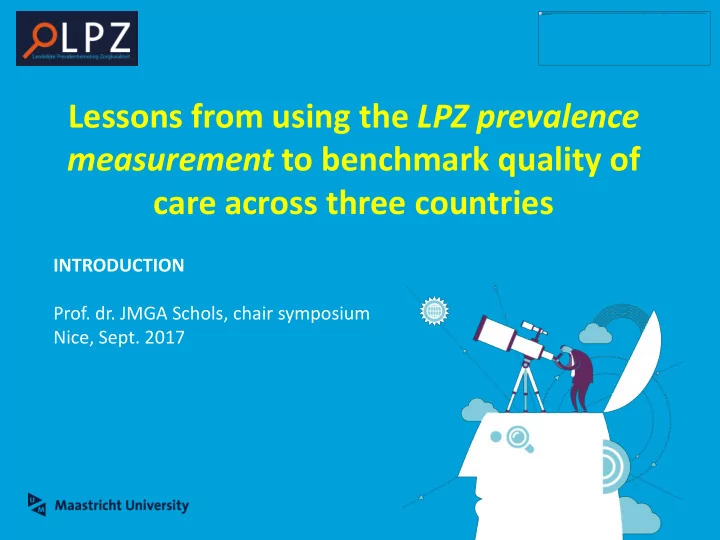

Lessons from using the LPZ prevalence measurement to benchmark quality of care across three countries INTRODUCTION Prof. dr. JMGA Schols, chair symposium Nice, Sept. 2017
CONFLICT OF INTEREST DISCLOSURE I have no potential conflict of interest to report
Quality of Care and Patient Safety are actual and very relevant issues! Fulfilling the basic care needs and adequately tackling relevant care problems are both very fundamental and important for the wellbeing and health of patients; and to a large extent also for patients’ safety! QoC has to contribute to QoL Health care organizations and health care professionals have to be transparent w.r.t their performance related to patient safety and QoC.
Nowadays … Health care organizations and health care professionals need data about their performance..; we call them ‘quality indicators’ or ‘performance indicators’
The prevalence of relevant care problems is representative for the basic quality of care Malnutrition
The annual (inter)national prevalence measurement of care problems (called LPZ-international) Allows uniform measurement of the prevalence of relevant care problems in all health care sectors Benefits HC- organizations/professionals, nationally and internationally: Feedback Benchmark Cues to optimize their (basic) care Puts care problems on the agenda and leads to care improvement activities
Method LPZ-International LPZ-I: Annual measurement of the prevalence, prevention, treatment and structural indicators of basic care problems Pressure ulcers, malnutrition, incontinence, falls, restraints and since 2016 pain;……. In different health care organizations (hospitals, nursing homes, home care) in different countries: Austria, Switzerland, UK, Turkey, The Netherlands
Method LPZ-International Hospitals, care homes and home care providers in each participating country are invited to participate each year Prevalence measurement on one day in April or November All patients are assessed by two assessors Questionnaire on three levels: patient level ward level institutional level More information: see van Nie-Visser et al. LPZ report: study design. An International prevalence measurement of care problems: study protocol J Adv Nurs. 2013 Sep;69(9):e18-29. doi: 10.1111/jan.12190
DONABEDIAN
Data entry LPZ-International Data can be entered in a web-based data-entry program after measurement or during the measurement with tablet/laptop
Validity and Reliability Questions based on valid instruments or developed by experts Data are gathered by trained workers of the organization itself Organizations get their own results They have to pay to participate No data of individual organizations are published.
Feedback LPZ-International Results are presented on a private site for each individual organization/ institution Each organization/institution receives the results compared with the results of the years before and the national figures of the related sector (benchmarking) Both on organizational/institutional as on department/ward level Data are presented in dashboards Raw data are also available for each institution in SPSS and in Excel
LPZ-i also allows research on care problems in and between different countries and also on the relation between individual care problems!
Program symposium 1. Which pressure ulcer preventive measures are used in Dutch nursing homes? A longitudinal study from 2005-2014. Martin van Leen, MD, PhD (The Netherlands) 2. Structural quality indicators of care problems in Austrian hospitals over a 3-year period. Doris Eglseer MSc, BBSc (Austria) 3. Can and should the LPZ-i be implemented in the UK? Adam Gordon, MD, PhD (United Kingdom)
Recommend
More recommend